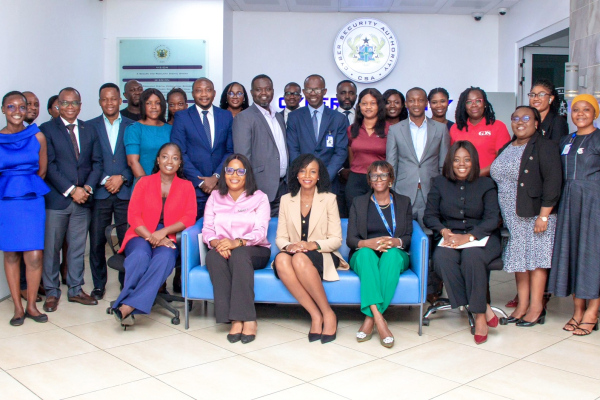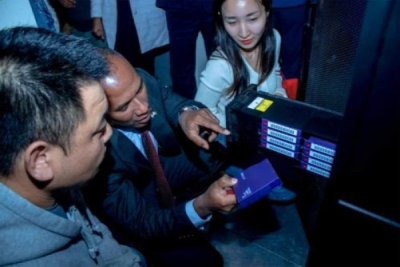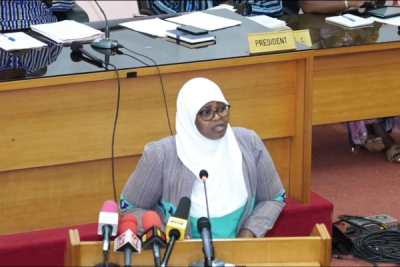
Public Management (604)
As part of the digitalization of various sectors, Algerian authorities have made significant strides in human resources management.
The Algerian Ministry of the Interior, Local Authorities, and Territorial Planning has completed the digitalization of administrative documents related to human resources management at both central and local levels. The announcement was made in a statement released on Saturday, July 13.
"This initiative has resulted in the digitalization of 25,792,410 documents, including those of senior executives, employees, contract agents in service, and retirees. These documents are organized into 735,926 electronic files, each containing 35 digitized documents," the statement reads.
Additionally, the ministry developed a decision-support system for human resources management, called "system power BI." This system utilizes data from the integrated and comprehensive Human Resources Information System (HRIS) to provide precise and real-time data analysis, as well as a forward-looking perspective in decision-making related to human resources management.
The acceleration of digital transformation in Algeria aligns with the directives of President Abdelmadjid Tebboune. Aiming for full digitalization of the country by 2034, the authorities are undertaking numerous actions across various sectors as part of the 2024-2029 digital transformation strategy.
The initiative is expected to enhance the efficiency and productivity of human resources services in state entities by reducing human errors and document processing delays, improving transparency and accountability within organizations and the government, eliminating phantom employees, and facilitating citizen access to services such as social benefit applications, payroll information consultation, and leave requests.
Adoni Conrad Quenum
Fueling the continent's ongoing technological revolution, African nations are actively pursuing initiatives to bolster their digital security.
The Ghanaian Cyber Security Authority (CSA) issued licenses and accreditations to 51 entities operating in the digital security space on July 10th. This move aims to establish a regulatory framework for Cybersecurity Service Providers (CSPs), Cybersecurity Establishments (CEs), and Cybersecurity Professionals (CPs) authorized to offer digital security services in the country.
"Today’s ceremony is not just a culmination but a catalyst for continued collaboration and innovation in our cybersecurity ecosystem. The synergy among CSPs, CEs, and CPs will drive us towards adaptive resilience and continuous improvement," said Adelaide Benneh-Prempeh, a member of the CSA Board of Directors.
The licensing initiative comes amidst a rising tide of cyberattacks across Africa. The continent's rapid digital transformation has increased its vulnerability, making robust cybersecurity a priority for governments. Ghana has taken steps by establishing a national strategy through the "Ghana National Cyber Security Policy & Strategy" and implementing the Computer Emergency Response Team (CERT-GH). This team plays a vital role in real-time threat monitoring and coordinating responses to major cybercrime incidents.
The country has also ratified the African Union Convention on Cyber Security and Personal Data Protection. It has deposited the instruments of accession to the Budapest Convention on Cybercrime.
In terms of cybersecurity preparedness, Ghana ranks third in Africa with a score of 86.69 out of 100, according to the 2021 "Global Cybersecurity Index" published by the International Telecommunication Union. This places the nation ahead of Nigeria (84.76) but behind Tanzania (90.58).
Adoni Conrad Quenum
Madagascar's customs services have launched a strategic plan for their digital transformation, partnering with various stakeholders to meet their objectives within the set timelines. This initiative aims to modernize customs operations, enhance efficiency, and streamline processes through the adoption of advanced technologies.
Last week, the Directorate General of Customs (DGD) in Madagascar inaugurated a data warehouse, a database management system designed for data storage and analysis. Funded by the Korea Customs Service, this infrastructure will enable long-term storage, combination, and archiving of data from various sources.
"Malagasy customs is progressing towards a performance-driven process where KPIs or key performance indicators are the guiding principles for the future of the administration. [...] We envisioned a future where customs decisions, including value assessments, temporary admissions, tariff groupings, and advance rulings, would be validated through a digital and rapid process designed to better serve users," said Ernest Zafivanona Lainkana, Director General of Malagasy Customs.
This initiative is part of the modernization and digitization of Madagascar's customs services, following a partnership signed on August 30, 2022, between the government of the Republic of Korea and the DGD. The aim is to support the DGD's strategic plan (31 projects) by funding three projects with a total of $5,163,000 over four years.
The data warehouse's capacity will allow the centralization and consolidation of all sensitive and strategic customs data over a period of 50 years. Additionally, the data center housing the infrastructure ensures continuous operation of new applications and has the potential to accommodate additional racks and servers.
Adoni Conrad Quenum
Douala's city services are going digital, and now it's the moto-taxi industry's turn. This push to modernize the transportation system aims to improve safety, streamline operations, and make things easier for both drivers and passengers.
In a press release issued on Wednesday, July 3rd, the Douala City Council announced a digital registration program for the city's moto-taxi drivers. This initiative aims to combat insecurity and help residents distinguish legitimate moto-taxis from potential criminals.
"We've collaborated with the administration to ensure a smooth digital registration process for our members," said Simplice Tabate, head of moto-taxis in Douala's Fourth District. "Following this launch, we'll replicate this approach in the Fourth District and other areas."
This program aligns with Cameroon's Digital Plan 2020-2025, which promotes digital technology as a driver of economic and social development. Douala has actively embraced this strategy, having digitized its parking system in November 2021. Earlier this year, the city launched a digital platform to attract investment from Cameroonian expatriates into the economic capital.
Starting July 11, moto-taxi drivers can register by presenting their national ID card, a valid category A driver's license, and their vehicle registration card. Inspections to verify registrations will commence on September 15.
The digital registration program aims to enhance safety and order within Douala. The platform will create a verified database of drivers, ensuring only authorized individuals operate moto-taxis in the city. This initiative reflects Douala's commitment to utilizing digital technology for improved public services and urban management.
Adoni Conrad Quenum
The Burkina Faso government is stepping up its efforts to improve cybersecurity. They're launching several initiatives to make their digital infrastructure more resilient and protect sensitive data from cyberattacks.
urkina Faso's Transitional Legislative Assembly (ALT) unanimously adopted the Information Systems Security Act on Tuesday, July 9. This new law establishes a legal framework to protect information systems, aiming to reduce vulnerabilities for public administrations and economic development units.
According to the Minister of Digital Transition, Posts, and Electronic Communications, Aminata Zerbo/Sabane (photo), the law is particularly important in the ongoing digitization process in the country. “We are firmly committed to dematerializing administrative acts and procedures to modernize, enhance productivity, transparency, and accessibility for all users. Further initiatives are underway to make digital technology a lever for our socio-economic development,” she stated.
This move reflects the government's focus on strengthening national cybersecurity amidst rapid digital transformation. The country is experiencing a surge in electronic communication services and cyberattacks, further amplified by the ongoing security crisis.
The law strengthens the National Agency for Information Systems Security (ANSSI), established in 2013 to address cyber vulnerabilities. It will not only support ANSSI's operations but also ensure its effective collaboration with other technical actors within the digital ecosystem.
The adoption of this Act marks a significant step for Burkina Faso in securing its digital infrastructure. By enhancing the country's cyber resilience, the law aims to build a safe and reliable digital environment for both citizens and economic actors.
Samira Njoya
The initiative aims to facilitate investments from members of the Cameroonian diaspora in their hometown and encourage economic contributions from Cameroonians living abroad, fostering development and growth in Douala
The Urban Community of Douala (CUD), the Douala's municipal government, unveiled its digital platform, icud-diaspora, on Wednesday, June 26, following the establishment of a framework for exchanges with the diaspora in December 2022. This initiative aims to encourage Cameroonians living abroad to invest in the country's economic capital.
"We took the time to analyze key insights, such as the unanimously expressed demand from our diaspora to establish digital bridges to better harness opportunities in Cameroon. Through this platform, we want to offer skills, networks, and relationships that will enable our diaspora to invest in Douala and help us meet the city's social demands," explained Douala's mayor, Roger Mbassa Ndine.
The icud-diaspora platform allows Cameroonian migrants to declare their projects for Douala with just a few clicks and propose their expertise. In return, the city government promises to offer public-private partnerships (PPP), a dedicated remote contact person, project assistance, online services, a network of approved providers, and land availability.
According to a diaspora consultation conducted by the CUD between June and August 2023, 72% of the 445 respondents are willing to invest if conditions are met, 49% desire a dedicated intermediary to facilitate their projects, and 81% prioritize the quality and reliability of information. The consultation identified main barriers to diaspora engagement, including economic, social, and political conditions, bureaucracy, lack of incentives, and a deficit of trust and knowledge about opportunities.
Currently, the CUD offers a dozen opportunities to the diaspora in infrastructure and urban planning, such as developing residential or commercial real estate projects, constructing and operating supermarkets, among others. Roger Mbassa Ndine emphasized, "It's about co-constructing Douala's development with Cameroonians abroad who are a strength for our country."
Remittances from the diaspora are significant for the national economy. According to the World Bank, remittances from Cameroonian migrants to their home country amounted to $365 million in 2022, an increase of about 5% compared to $350 million in 2021. Douala aims to leverage these funds to drive its development.
Frédéric Nonos
In July 2022, Togo set a goal to digitize 75% of its administrative procedures by 2025.
Togo and Kazakhstan are strengthening their cooperation in the digitalization of public services. Togo's government agency, Togo Digital Agency (ATD), has formed a strategic partnership with Kazakhstan's National Information Technologies (NITEC). According to Togo First, this partnership will enable ATD to leverage NITEC's resources and expertise for its digital projects.
"This partnership will allow ATD to benefit from NITEC's expertise on various subjects to accelerate the digitalization of public services and administrations," stated the Togolese agency.
This initiative is part of the efforts to strengthen diplomatic relations between the two countries, particularly following President Faure Gnassingbé's visit to Kazakhstan. NITEC, ranked 28th on the E-Government Development Index and 8th on the UN's Online Services Index, is expected to bring its expertise to Togo, helping the country deploy advanced technologies to improve its public services.
It is worth noting that Togo aims to digitalize 75% of its public services by 2030.
Ayi Renaud Dossavi
Kenya aims to become a leading technology hub in East Africa. To achieve this goal, the country has secured investment from Poland for its ongoing smart city project, which began in 2012.
Farada Group, a Polish company specializing in unmanned aerial systems (UAS), has announced that it has obtained all necessary documents from the Kenya Civil Aviation Authority (KCAA) to set up a manufacturing plant in Konza Technopolis, Kenya. The goal is to make the country its main hub to serve the African market.
Speaking on the matter, Adam Cudny, President of Farada Group, stated: “We plan to acquire a plot of land here in Konza Technopolis to establish a drone manufacturing company for Kenya and the whole of Africa. [...] We have all the necessary approvals and we have set up a local company to implement the project.”
This Polish investment is part of the state visit of Polish President Andrzej Duda to Kenya in February. The two countries decided to collaborate in various sectors, and Farada Group's leaders, present during the visit, established connections with Kenyan authorities. On this occasion, they donated a drone to the Kenya Wildlife Service (KWS) to help monitor the country’s national parks.
The drones manufactured by the Polish company are used for wildlife surveillance, monitoring power lines, responding to natural disasters (such as floods and wildfires), and delivering essential goods like medical supplies. Additionally, earlier this month, the Korea Eximbank signed two agreements with Kenyan authorities to invest $238 million in Konza Technopolis. The project, once abandoned, has regained momentum in recent years and is central to Kenya’s national development plan, Vision 2030.
Adoni Conrad Quenum
The Congolese government aims to enhance its ability to provide public services tailored to the needs of the population through digital means. This initiative is a key objective of the Digital Transformation Acceleration Project.
On Friday, June 14, Léon Juste Ibombo (photo, center), Congolese Minister of Posts, Telecommunications, and Digital Economy, launched a high-speed internet connection project for public administrations nationwide. The six-month project, valued at €3.2 million (around $3.5
million), is being undertaken by Silicone Connect.
The initial phase will focus on the Ministries of Interior, Posts and Telecommunications, Health, Justice, Social Affairs, and Public Service. It involves installing Wi-Fi access points and implementing digital services.
Minister Ibombo anticipates improved connectivity for civil registry centers within the public service sector. This will strengthen the integrated civil registry system, enabling efficient synchronization and better management of civil data. "Healthcare and Justice sectors will also benefit from increased connectivity in their respective registry centers, hospitals, and courts, ensuring smooth and transparent data management" he added.
This initiative follows the deployment of high-speed internet in Congolese public universities two months prior. It aligns with the Digital Transformation Acceleration Project (PATN). PATN aims to expand high-speed internet access for underserved populations and enhance the government's ability to deliver targeted public services digitally. The World Bank is supporting the $100 million project, with an allocated budget of approximately $64 million for 2024.
By 2025, the Congolese government aims to achieve equitable access to digital services for all citizens. "As digital technology becomes a critical pillar of our development, this project aligns with the President's vision to prepare Congo for a digital, inclusive, and dynamic future the information society," Minister Ibombo declared
Isaac K. Kassouwi
The Burkinabe government aims to accelerate digital transformation and make it a cornerstone of socio-economic development. However, it must first ensure widespread Internet access across the country, including homes, government offices, hospitals, and schools.
On Friday, June 14, Burkina Faso launched high-speed internet connection for nine out of ten higher education and research institutions (HERIs). The $6.2 million project was financed by the World Bank and implemented with the technical assistance of the mobile operator Orange Burkina Faso.
"We provided the Ministry of Higher Education with IT equipment, including Wi-Fi devices installed in the nine HERIs," said Nafy Silué Coulibaly, CEO of Orange. "We also worked to connect the various buildings [174 in total, Ed.] with very high-speed fiber connectivity, and trained 29 engineers who will ensure the monitoring and maintenance of the entire system for the sustainability of the project."
The project launch follows President Ibrahim Traoré's meeting with the academic community in January 2023, which focused on the challenges plaguing the country's universities and education system. The Burkina Faso head of state instructed Adjima Thiombiano, Minister of Higher Education, Research, and Innovation, to equip the country's HERIs with high-speed internet.
According to Mr. Thiombiano, providing high-speed internet in Burkina Faso's public universities will help expand e-learning by facilitating access to online information and educational resources. It will also foster collaboration and knowledge exchange among stakeholders, improve students' digital skills, and stimulate innovation and creativity.
Furthermore, this initiative is part of the digital transformation drive in which the Burkina Faso government is engaged. The government aims to introduce digital technology in all sectors to make it an instrument of societal transformation and socio-economic development.
Isaac K. Kassouwi
More...
Africa's digital transformation is gaining momentum, and building a strong digital infrastructure is crucial to achieving the goals outlined in previous strategy documents.
Mauritania plans to install an additional 2,300 kilometers of optic fiber cable nationwide, Minister of Digital Transformation Mohamed Abdallahi Ould Louly announced on June 10th. The plan, unveiled at the launch of a fiber optic training program, aims to connect all wilayas and moughatas to fiber optic infrastructure.
This initiative is part of the Mauritanian government's Digital Agenda 2022-2025, which seeks to leverage digital technology as a catalyst for accelerating the country's socio-economic development. In May 2021, the government established a specialized ministry to oversee all projects related to this vision. Since then, the country has already implemented more than 5,500 kilometers of fiber optic cable as part of its efforts to improve digital infrastructure.
In addition to political will, this progress has been driven by various partnerships. Notable agreements include several partnerships with the United Arab Emirates and France, as well as prospects for enhanced cooperation in the digital sector with the United Nations. On April 2, the Mauritanian minister met with Leila Peters Yahya, the UN system's Resident Coordinator in Mauritania, in Nouakchott to discuss these collaborations.
Under its Digital Agenda 2022-2025, Mauritania planned to lay 4,000 kilometers of backbone infrastructure by 2025 and has outlined plans for an additional 4,000 kilometers in the coming years. The goal is to enhance Internet connectivity and access to international bandwidth, which are essential conditions for the development of e-government, the proliferation of startups, and the emergence of a technological ecosystem in the country.
Adoni Conrad Quenum
In 2021, Zambia recorded over 10 million cyberattacks, while losses for the financial sector were estimated at approximately $5.6 million between 2020 and the second quarter of 2022, according to the government.
In Zambia, a court has sentenced 22 Chinese nationals and a Cameroonian to prison terms ranging from seven to eleven years, along with fines for cybercrime, as reported by AP News on Saturday, June 8.
These convictions follow a series of investigations that began after a surge in computer fraud cases. Many victims reported unexplained losses of money from their mobile phones and bank accounts. The convicted individuals were part of an Internet fraud network, dismantled last April, which comprised 77 members, mostly Zambians. During the raid that led to their arrest, authorities seized over 13,000 SIM cards, firearms, and ammunition. The online scams orchestrated by this network primarily targeted Zambians, as well as individuals in Singapore, Peru, and the United Arab Emirates.
According to government data, Zambia recorded 10,718,002 cyberattacks in 2021. Also, the financial sector lost more than 150 million kwachas ($5.6 million) between 2020 and the second quarter of 2022.
In 2021, the country enacted the Cybersecurity and Cybercrimes Act, which aims to protect people online, especially children, and to facilitate the identification, reporting, and protection of critical information infrastructures.
Meanwile, the country ranked 10th in Africa and 73rd globally in the Global Cybersecurity Index (GCI) 2020 with a score of 68.88%.
Charlène N’dimon
The Chadian government launched an ambitious Strategic Plan for Digital and Postal Development in 2020, demonstrating its commitment to bridging the country's technological gap.
Chad's Minister of Communications, Digital Economy, and Administration Digitalization, Boukar Michel, met with United Nations Economic Commission for Africa (UNECA) Executive Secretary Claver Gatete on the sidelines of the ICANN80 summit in Kigali, Rwanda, yesterday June 10th.
The discussion centered on fostering collaboration to address key challenges and unlock opportunities in Chad's digital sector. Minister Michel presented the country's Strategic Plan for Digital and Postal Development 2020-2030 (PSDNP) and the new president's digital policy platform. This presentation, according to a ministry statement, aimed to showcase Chad's digital ambitions and priorities, outlining both completed and planned initiatives.
Launched in 2020, the PSDNP serves as an ambitious roadmap for Chad's digital transformation. It outlines a series of reforms targeting key sectors like healthcare, education, and telecommunications. These reforms aim to expand access to digital services, bolster technological infrastructure, and cultivate innovation. The government estimates the total cost of implementing these projects at 1452 billion FCFA (US$2.4 billion).
Both parties concluded the meeting by reaffirming their dedication to strengthening cooperation and accelerating Chad's digital transformation journey. This collaboration positions Chad to leverage UNECA's expertise in developing robust digital infrastructure, enhancing digital skills, and more.
Samira Njoya
Agriculture is a vital sector for African economies. With the digital transformation amidst a technological revolution on the continent, digitizing the agricultural sector has become crucial for many countries across the continent.
The Ethiopian Agricultural Transformation Institute (ATI) signed a Memorandum of Understanding (MoU) with Digital Green, a U.S.-based non-profit focused on digitizing agriculture, to empower farmers through digital solutions.
The announcement, made by Digital Green on Facebook on June 2, outlines a five-year collaboration aimed at maximizing agricultural and socio-economic benefits for farmers, particularly women and youth, in the operational regions of both organizations.
The initiative will establish a knowledge-sharing platform built on FarmStack, an open-source data and content-sharing network. This platform will leverage APIs, URLs, and CKAN integrations for seamless information exchange.
"We're thrilled to announce that we have signed a Memorandum of Understanding (MOU) with Ethiopian Agricultural Transformation Agency to maximize the agricultural and socio-economic benefits for farmers, women, and youth in the operational regions and Woredas of both organizations," Digital Green wrote on their Facebook page. "This five-year MOU aims to outline collaborative efforts in digital agriculture, youth job creation, women empowerment, market information systems, resource mobilization, and data sharing."
Ethiopia's digital transformation strategy includes digitizing the agricultural sector. The government partnered with local agritech firm Lersha to create digital profiles for over 1 million small-scale farmers, granting them access to various digital agriculture services.
"Together, we will implement initiatives to digitize farmer registries, enhance digital agricultural extension channels, and improve market access, ultimately benefiting farmers, women, and youth across Ethiopia," Digital Green added.
Adoni Conrad Quenum















